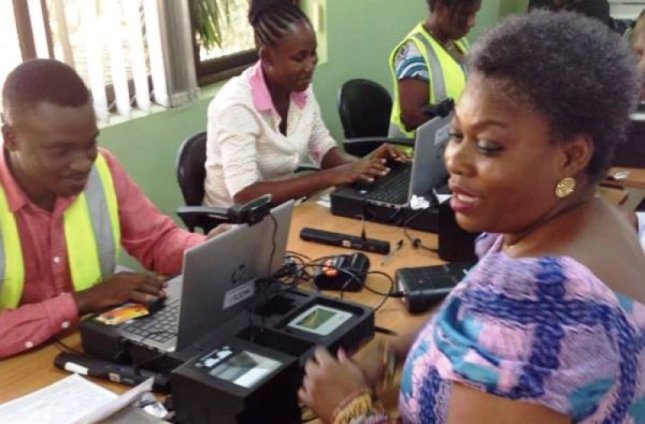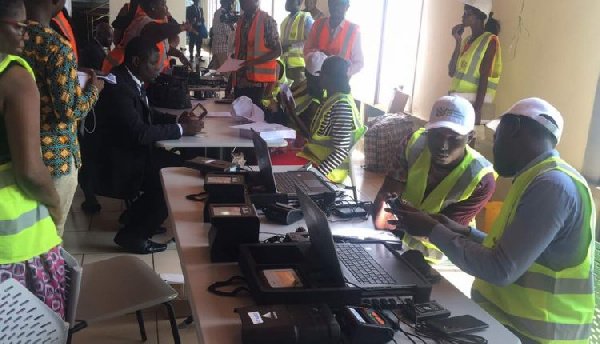The National Identification Authority (NIA) has strongly denied claims circulating on social media suggesting that the validity period of the Ghana Card will be reduced from ten years.
The Authority clarified that no such amendment has been made or proposed, stressing that the Ghana Card remains valid for ten years from the date of issuance, after which it must be renewed as required by law.
Williams Ampomah E. Darlas, Head of the Corporate Affairs Directorate, described the reports as misleading and cautioned the public against giving them any credibility. According to the NIA, the misinformation appears to have stemmed from misinterpretations of comments made by its Executive Secretary, Mr. Wisdom Kwaku Yayra Deku, during a recent media engagement.
Mr. Deku had reportedly raised the possibility of future reviews of the validity period of the Ghana Card in the context of technological innovation and the evolving uses of the national identity system.

However, the Authority clarified that his remarks were not intended to signal any immediate change in policy or law. Rather, they were to highlight the importance of ensuring that the Ghana Card remains responsive to advances in technology and its expanding role in both public and private services.
“The Executive Secretary did not announce any change in policy. His remarks reflected a proposal that, given the rapid pace of technological advancement and the evolving uses of the Ghana Card, future reviews could consider a shorter update interval.”
Williams Ampomah E. Darlas, Head of the Corporate Affairs Directorate
Commitment to maintaining a Future-ready National Identity
The NIA pointed out that such forward-looking discussions were consistent with its commitment to maintaining a secure, reliable, and future-ready national identity system for all Ghanaians.
As an example, the Authority cited its earlier decision to upgrade from the initial 2D-barcode card issued to children under 15 years to the current dual-interface, multipurpose biometric card. This, it explained, demonstrated how the institution adapts its systems to meet changing needs without undermining existing policies.
Despite the speculation, the Authority emphasized that the current ten-year renewal cycle is still grounded in practical considerations. The physical card, it explained, has an estimated lifespan of a decade, beyond which the risk of wear and tear increases.
Moreover, the Authority stressed the importance of updating cardholders’ biometric and personal data after ten years to reflect changes in facial features and other physical characteristics.

“This requirement ensures that the Ghana Card remains an accurate and reliable form of identification throughout a person’s lifetime,” the statement noted. It further assured Ghanaians that the renewal process is a standard feature of identity management systems worldwide, designed to maintain both the integrity and the security of the national database.
The NIA also used the opportunity to reaffirm its broader mission of building and maintaining a trusted national identity framework that can support a wide range of services, from financial transactions and healthcare delivery to electoral processes.
By addressing misinformation swiftly, the Authority underscored the importance of public confidence in the system and the dangers posed by misleading narratives.
In its communication, the Authority urged citizens to rely on official updates issued through its corporate channels rather than social media platforms, which often carry unverified information. It assured the public that any policy changes affecting the Ghana Card would be subjected to the necessary legal and consultative processes before being implemented.
The Ghana Card has, over the years, become a cornerstone of Ghana’s digital and identification landscape, serving as the foundation for numerous government and private sector programmes. Its widespread adoption has made it one of the most important tools in facilitating access to essential services, promoting financial inclusion, and enhancing national security

By reiterating that the card’s validity remains ten years, the NIA sought to put to rest public concerns that could undermine confidence in its identity systems.
The Authority concluded by reaffirming its dedication to delivering a modern identity infrastructure capable of keeping pace with technological changes while remaining firmly anchored in the legal provisions of the state.
For now, the Ghana Card’s place in Ghana’s governance and development architecture remains unshaken. Its ten-year validity period continues to hold, and citizens are expected to renew their cards after that duration in line with the existing framework.
The NIA’s swift response to the misinformation reflects both the importance of the card to national life and the Authority’s commitment to guarding its credibility.
READ ALSO: Businesses to Breakthrough as Ghana Targets Faster Registrations, Lower Taxes, and Job Creation






















